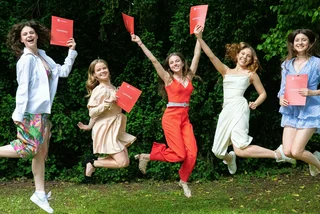In the past several years, the media has become a central, inescapable, and growing force in politics around the globe — and, some critics might say, vice versa. Is social media dangerous to democracy? Does physical space shape political communication? These are just some of the questions that reflect what happens when politics and media converge.
That intersection — and the ways in which the realms of politics and media inform and shape one another — is the subject of an increasingly popular study program based in Prague, one that is currently enrolling students for its third fall semester. The application deadline is September 2.
Charles University’s Media and Areas Studies (MARS) program is a 2-year Master’s degree program. Like a traditional media studies program, it examines media studies as an academic discipline but remains unique for its equal — and rather timely — emphasis on studying the ways in which power, politics, and ideology work and intersect with the study of media.
According to the program’s director, Nico Carpentier, the current chairman of the International Association for Media and Communication Research, MARS combines three elements, all of which matter in our present world: media, politics, and space. “While we are a media studies program, politics is just as central to the program and intersects with the study of media,” he says.
“For instance, political leadership becomes extremely important in moments of crisis, where quick coordinated action can save lives, and indecisiveness can endanger entire societies,” says Carpentier, “But that also puts pressure on democratic decision-making, and might create systems of control and surveillance that are undesirable in the long run.”
Carpentier says MARS arose out of what he sees as an increasingly urgent need for training “reflexive practitioners” who can analyze the social, political, and cultural role of mediated communication in an increasingly complex world, and to evaluate different sources of information critically.
“We need people with strong intellectual training that can solve complex issues in contexts that are themselves complex, diverse and ever-changing,” he says. “MARS is designed to produce this kind of training, so that our students when they obtain their degrees, can play a role in a future world that will only be more and more multi-layered.”
MARS represents a collaboration between the Institute of Communication Studies and Journalism and the Institute of International Studies – both at the Faculty of Social Sciences, Charles University – with a particular focus on the Czech Republic, Central, and Eastern Europe and the European Union; its students are expected to gain in-depth knowledge about the media and political ecology of these regions.
Traditional media and communications programs over the world teach students the same universal theories without much regard to varying local contexts," says program coordinator Jan Miessler. "At MARS, we emphasize the context because, in different places, media and politics work in different ways."
Miessler also praised the work of the International Office of Charles University, which worked tirelessly to ensure that a truly global student body could participate in the course, despite the difficulties and the restrictions caused by the pandemic during the first year of the programme.
This sentiment was echoed by his colleague Dr. Vaia Doudaki, who was impressed by the engagement and commitment of the student body, adding that she was very glad to see students joining the programme from different countries, different academic cultures, and diverse disciplinary backgrounds.
Classes, which are taught in English, present courses such as “Czech Media System in European Comparison,” “Conflict and Media in Southern Europe,” “Political Geography” and “Theorizing Memory” that all look at this intersection of media, politics and space. Research and vocational internships are part of the program.
Future graduates of the program could conceivably go on to land senior/advisory positions in a variety of social fields and organizations, including state administrations, public service institutions, and non-profit organizations, and the private sector, including the media.
"My goal is still to work in journalism or documentary cinema," says Swiss student, Coline, who is currently enrolled on the course. "I think the advantage of MARS is to have a theoretical and academic background. I am considering the possibility of being able to work as a correspondent, in Central Europe, for a media (Swiss or French for example), or an international press agency."
“Understanding how communication, and media work, also allows us to see how other fields work, how our cultures, our politics, our social interactions work,” says Carpentier. “MARS is very much about looking at these intersections and taking the specificity of regions into consideration,” he says.
This has been borne out by the experience of Cai, a Chinese student on the course. "After taking part in the MARS program for the first year, the courses of 'East Asian Media' and the 'Czech Media System in European Comparison' have really appealed to me," she says. "As an Asian student, it is really interesting to study your culture from different angles. These two courses provided me with a comparative perspective on how to study historical developments that shaped the media system."
Charles University’s Media and Area Studies Masters’ Degree is currently accepting applications until September 2, 2022.
This article was written in cooperation with the Faculty of Social Sciences of Charles University. Read more about our partner content policies here.












 Reading time: 4 minutes
Reading time: 4 minutes 


























